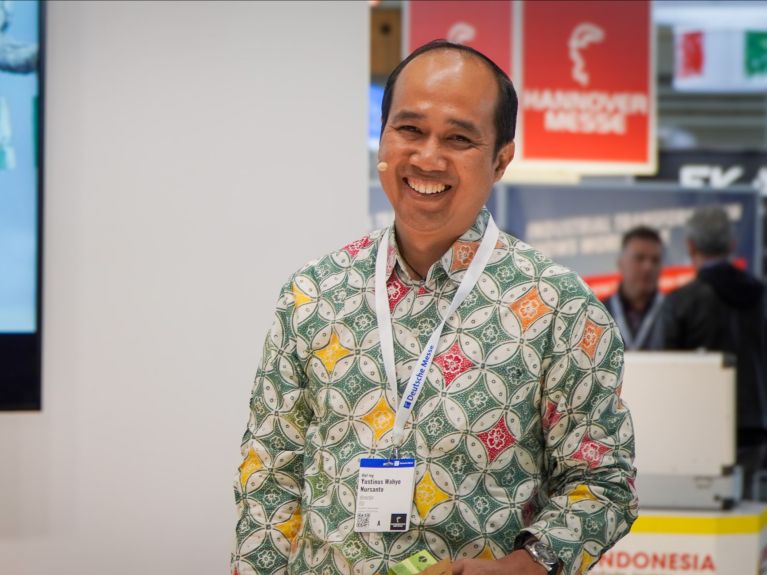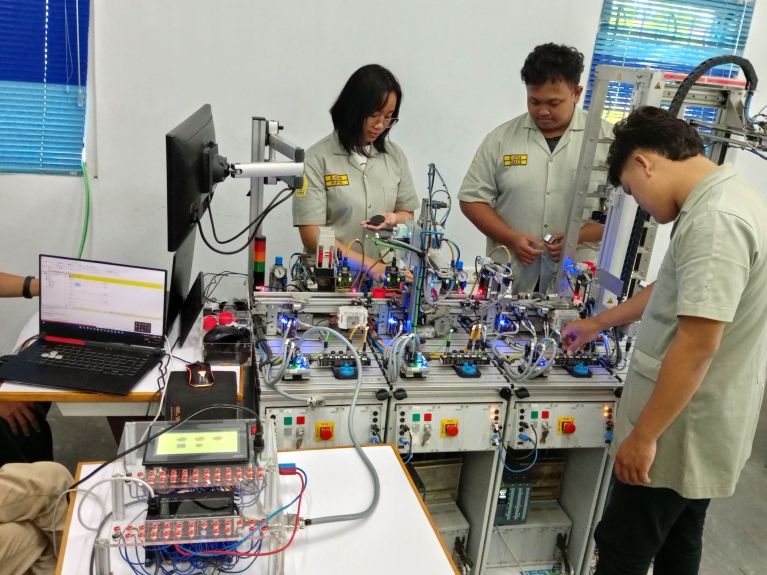Mediator between education and business
Engineer Justin Wahyo is actively committed to establishing dual vocational training in Indonesia.

Practising international networking: we present individuals who symbolise Germany’s partnerships around the world. Global challenges can only be overcome by working together.
Justin Wahyo had other options. It would have been no problem for him to get a good job in industry. But he opted to do an apprenticeship instead – at a vocational school, or a polytechnic college to be precise. It’s called the “Academy of Industrial Mechanical Engineering” (ATMI) and is located in the city of Surakarta on Java. Germany has contributed significantly to its good reputation.
Wahyo has never regretted his decision. To this day, he continues to develop new plans to make even more profitable use of the links between business and education. And he knows exactly what he’s talking about: after all, he himself is a “product” of ATMI, having graduated there in 1994 according to the German model.
Training as a contribution to development
Today, he looks back on his experience with pride – not only because ATMI opened up a wide range of opportunities for him personally, but also because the institution itself is rather special: it was founded in 1968 by German and Swiss Jesuits who wanted to support Indonesia’s development by providing children and young people from poor families in particular with a good education. The model was to be the German system of dual vocational training, which involves about one third theory and two thirds practical work.

Germany later also became officially involved: from 2001 to 2009, the German development agency GIZ and the German investment and development bank KfW supported the so-called “Indonesian-German Institute” – a vocational training alliance consisting of five training centres and 17 vocational schools, including the ATMI.
Wahyo’s biography is closely linked to the history of ATMI. Shortly before graduating, he was asked by the director to stay on. It didn’t take Wahyo long to make up his mind, but he did stipulate one condition: he wanted to go and study abroad first. The director couldn’t make any promises, but he did agree to support Wahyo.
Return after studying in Europe
Everything worked out: Wahyo went to Switzerland on a scholarship, first completing a bachelor’s degree and then going on to do a master’s degree in industrial engineering. He stayed in Europe for five years, during which time he learnt German and made contacts. He returned to the ATMI in 2001, just as Germany was starting to provide official support for the Institute, thereby enabling it to expand. He subsequently worked closely with the GIZ.
As the years have passed, the concept of interlinking education and business has not changed. Thanks in part to support from Germany, a second campus was added, and a little later the range of courses on offer also grew – in addition to manufacturing as a specialisation, ATMI now offers mechatronics and construction technology as well.
Training centre with a company of its own
Wahyo initially worked as a teacher before moving to the ATMI IGI Centre in 2006. This is also a rather exceptional aspect of ATMI: since it was clear that the institution would not receive foreign support in the long term and state funding from Indonesia was still limited, ATMI founded a company of its own – the ATMI IGI Centre. Here, trainees get to learn their trade hands-on. They work for a regular business, manufacturing products in real-life conditions.
We teach them to work independently, with a solution-oriented mindset.
Today, ATMI IGI specialises in sustainable product development in the areas of injection-moulded plastics and new, biodegradable materials. The organisation calls its concept “production-based training”: trainees are quickly immersed in the day-to-day running of the company and take on responsibility. “We teach them to work independently and adopt a solution-oriented mindset,” says Wahyo. This makes ATMI graduates sought-after specialists.
Wahyo is now the director of ATMI IGI. In this role he also represents his institute and the dual vocational training system in Indonesia’s Chamber of Commerce KADIN. And he’s always coming up with new ideas: in future, Wayho would like to attract more international companies, offer them products, and act as a point of contact for business activities in Indonesia – all at a high technological level.
At Hannover Messe on two occasions
In the area of sustainability in particular, Wayho has Germany and Switzerland firmly in his sights – the original ATMI sponsors. ATMI already works with a number of German companies such as Elektrotechnische Apparate GmbH (E-T-A) near Nuremberg, Arburg GmbH in the Black Forest, and Toolcraft AG in Georgensgmünd, Bavaria.
In search of more contacts, Wayho has represented the ATMI twice at Hannover Messe, most recently in April 2024. Next he would like to bring skilled workers to Germany: talks are already underway. Wahyo’s idea is that ATMI teaching staff could undergo further training in Germany, too. “That would be a win-win situation for everyone concerned.”


